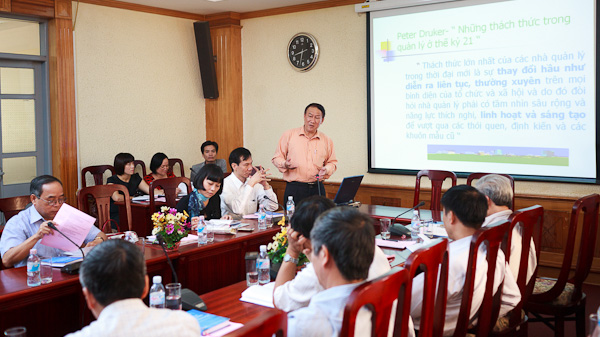A scientific conference on the theme "Culture of Quality in Universities" was held on October 20th. Attendees included Assoc. Prof. Dr. Nguyen Kim Son - Vice Rector of the University, scientists, administrators, and representatives from universities nationwide.The main content of the workshop focused on discussing key issues: quality culture and sustainable development in universities; building and developing a quality culture in universities in Vietnam in general and for the University of Social Sciences and Humanities in particular; and quality culture in teaching, learning, and assessment. Universities in Vietnam have been and are currently building and developing a quality culture. The University of Social Sciences and Humanities has also been gradually building a quality culture. Speaking at the workshop, Assoc. Prof. Dr. Nguyen Kim Son stated: For the University of Social Sciences and Humanities, building a quality culture is closely linked to ensuring the quality of teaching and learning for both teachers and students. Organizing feedback from students on the teaching activities of lecturers is an activity that strengthens democracy within the University but at the same time builds a new quality culture. On the other hand, quality culture is closely linked to ensuring the quality of faculties/departments/training programs; Building and developing a culture of quality is closely linked to improving and enhancing the quality of education. At the University of Social Sciences and Humanities, developing a culture of quality means changing the culture towards a broader convergence in thinking and acting on quality and the associated values.

Associate Professor Tran Khanh Duc (University of Education), in his presentation "Developing Cultural and Humanistic Values and the Model of the Future University," outlined the characteristics and trends of modern higher education development. The development of the higher education system is influenced and shaped by economic, cultural, social, scientific, and technological factors, while also contributing to the overall development trends of modern society. In this context, higher education in various countries has faced numerous significant opportunities and challenges. Particularly important is the issue of resolving the relationships between scale, quality, and effectiveness of training; between training and research/services; and between needs and resources for development. Discussing the model of a quality culture in higher education institutions, Associate Professor Dr. Le Duc Ngoc (Director of the Center for Accreditation, Measurement and Evaluation of Educational Quality - CAMEEQ, VIPUA) stated that building a quality culture means creating environments where the components of these environments are values that guide quality activities and development, which are agreed upon and implemented by the community of that higher education institution. According to him, the five environmental components of a quality culture in higher education institutions include: the academic environment, the social environment, the humanistic environment, the cultural environment, and the natural environment.

Many other opinions focus on emphasizing that a culture of quality encompasses the thoughts, perspectives, and orientations of individuals and organizations towards the quality of teaching and learning. Building this culture is a process that requires leaders, staff, lecturers, and employees of the university to constantly think about how to continuously improve teaching, learning, scientific research, and other aspects of work. According to Assoc. Prof. Dr. Nguyen Chi Hoa – Director of the Center for Quality Assurance (University of Social Sciences and Humanities) – a culture of quality includes three elements: quality values, quality principles, and quality conduct. Building and developing a culture of quality is an objective requirement for every university aiming for regional and international standards. In August 2008, the University of Social Sciences and Humanities organized a workshop on "Quality Accreditation, Evaluation, and Management," and the issues raised in the workshop had a positive impact on the university's quality assurance work.


